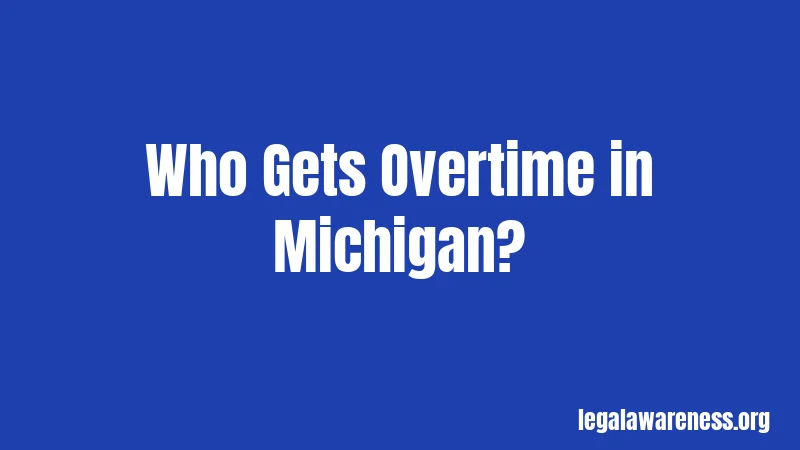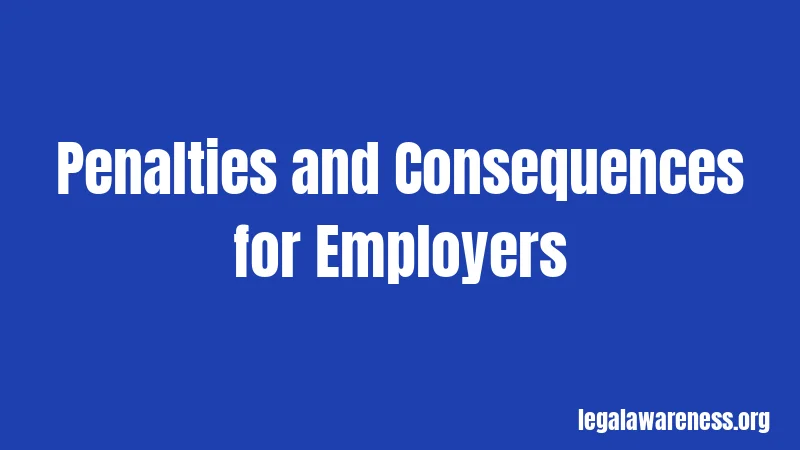Michigan Overtime Laws in 2026: Your Paycheck Protection Guide
You probably spend 40 hours a week at work. But what happens when you’re asked to work more than that? Most people have no idea what the law says. Seriously. In Michigan, overtime laws are pretty clear, and they exist to protect you and your paycheck.
Here’s the thing. Your employer can’t just work you extra hours without paying you more. There are actual rules about this. Let’s break down exactly what you need to know about overtime in Michigan.
What Is Overtime Pay?
Overtime is simple. It’s when you work more than 40 hours in a single week. Your employer has to pay you extra for those extra hours. In Michigan, that “extra” pay is pretty significant.
Think of it like a reward for your effort. The law says you deserve more money for working beyond a normal full-time schedule. Right? That makes sense.
Basic Michigan Overtime Requirements
The 40-Hour Rule
Here’s the foundation. In Michigan, overtime kicks in when you work over 40 hours in a week. One extra hour? That’s overtime. Ten extra hours? Also overtime. Every single hour beyond 40 gets special treatment.
You’re probably wondering: what exactly do I get paid? Here’s where it gets good.
Time and a Half (1.5x Pay)
This is the key number. Michigan law requires your employer to pay you 1.5 times your regular hourly rate for every overtime hour. Let me show you what that looks like in real money.
Say you earn $15 per hour normally. For overtime hours, you’d get $22.50 per hour. That’s a $7.50 difference per hour. If you work 10 hours of overtime in a week, you’re talking about an extra $75. Over a year, that adds up fast.
The math is straightforward. And honestly, this protection is one of the most important worker rights in Michigan.
How Your Employer Calculates It
Your employer has to calculate overtime correctly. They take your regular hourly rate and multiply it by 1.5. That’s it. No tricks. No exceptions (except for certain exempt employees we’ll talk about).
Wondering if your employer is doing this right? Check your pay stub. Look for overtime hours listed separately. They should show up clearly.
Who Gets Overtime in Michigan?

Not everyone qualifies for overtime. This is where things get a tiny bit tricky. But stay with me.
Most hourly workers get overtime protection. That’s the majority of people. If your employer pays you by the hour, you almost certainly qualify. Yep, that’s all you need to know for most people.
Exempt Employees (The Exception)
Some workers are “exempt” from overtime requirements. These are usually people in management, professional roles, or supervisory positions. Think of it like having a different employment category.
Your employer can’t just decide you’re exempt to avoid paying overtime. There are specific rules about who qualifies. Usually, you need to make a certain salary level and have specific job duties. The salary floor in Michigan is fairly high, which protects a lot of workers.
Not sure if you’re exempt? Ask your employer for a written explanation. Most of the time, if you’re paid hourly, you’re entitled to overtime.
Common Misconceptions
Many people think they’re exempt when they actually aren’t. This happens a lot. Your employer might tell you that overtime doesn’t apply to your position. That might not be true. Don’t just accept it.
If you think your employer is misclassifying you, you can contact the Michigan Department of Labor. They investigate these situations. Seriously, this happens more than you’d think, and you have rights.
Recent Changes to Michigan Overtime Laws
Hold on, this part’s important. Michigan’s overtime laws are tied to federal law. When federal minimum wage and overtime rules changed, Michigan had to follow along.
As of 2025, Michigan’s overtime rules remained consistent with federal Fair Labor Standards Act requirements. The overtime threshold is 40 hours per week. This hasn’t changed recently, but it’s good to know what’s actually happening.
Honestly, this is the part most people miss. They assume the rules changed when really they’ve stayed pretty stable.
Penalties and Consequences for Employers

Okay, pause. Read this carefully. If your employer fails to pay overtime, they’re breaking the law.
The consequences can be serious. We’re not talking about a small slap on the wrist here. Your employer could face lawsuits and have to pay back wages. Back wages means they have to pay you all the overtime you should have earned, plus penalties.
Many employers also have to pay “liquidated damages.” This basically doubles what they owe you. So if you’re owed $1,000 in overtime, you might get $2,000 total. That gets their attention.
On top of that, you could recover attorney fees. This means if you hire a lawyer to sue, your employer might have to pay your legal costs. That’s a pretty strong incentive for employers to follow the law.
The penalty system is actually set up to protect you. It discourages employers from cheating on overtime.
Special Circumstances and Exceptions
What Counts as “Work Time”?
Here’s where it gets interesting. Work time includes obvious things. Time spent actually working counts. Time you’re required to be at work counts. Even some time waiting to work counts.
But lunch breaks don’t count. Time clocks are your friend here. If you clock out for lunch, that time shouldn’t be counted. Similarly, brief breaks (usually under 20 minutes) are paid and count toward your 40 hours.
Confused about what counts? Look at your time cards. Track your actual hours worked. When in doubt, you can ask your state labor department.
Overnight Shifts and Special Schedules
Do you work overnight? The rule is still the same. Forty hours in a week triggers overtime. It doesn’t matter what time of day you work.
Some people work shifts that span midnight. The hour still counts. The day it happens on doesn’t matter. The week matters. Everything is calculated on a weekly basis.
Employees Who Get Commissions
If you earn commissions on top of your hourly wage, things are slightly different. Your overtime rate is calculated based on your total regular earnings, not just your base hourly rate. This protects you from earning less in overtime than you’d expect.
Your employer should explain how this works. If they don’t, ask. You have a right to understand how your paycheck is calculated.
How to Protect Your Overtime Rights
This is where you take action. Here’s what you should do.
Keep Detailed Records
Track your hours yourself. Write down when you start work and when you leave. Use your phone if you need to. Create a simple spreadsheet. This creates evidence if there’s ever a dispute.
Your employer should be tracking this officially. But having your own record is powerful. It protects you.
Check Your Pay Stubs Regularly
Look at your paychecks. Seriously, do this every single time. Are overtime hours listed separately? Is the math correct? Does the overtime rate match the law?
If something looks wrong, it probably is. Address it immediately. Talk to your manager or HR. Get it in writing.
Know Your Rights
You have a right to overtime pay. That’s not negotiable. You can’t sign it away or agree to waive it. Even if you want to work without overtime pay, your employer can’t legally allow that.
If an employer tells you that overtime isn’t available or won’t be paid, that’s a red flag. Very red. That might be illegal.
Report Violations
If your employer isn’t paying overtime correctly, you have options. You can file a complaint with the Michigan Department of Labor. You can also contact the U.S. Department of Labor.
You can also consult with an employment attorney. Many offer free consultations. This isn’t extreme. It’s your right.
Michigan Department of Labor Resources
The Michigan Department of Labor handles wage and hour complaints. You can contact them if you think your employer is violating overtime laws. Their investigators take these cases seriously.
They can help you understand whether your situation is legal. They can also investigate your employer if you file a formal complaint. This process is free and confidential.
If you need help, go to the Michigan Department of Labor website. They have resources available. Or call them directly. This is what they’re there for.
Frequently Asked Questions
Can my employer make me work overtime?
Your employer can require you to work overtime if you’re not exempt. However, they must pay you 1.5 times your regular rate for all hours over 40 per week. They can’t force you to volunteer unpaid overtime.
What if I’m salaried instead of hourly?
Salaried employees can still be entitled to overtime, depending on their salary level and job duties. Many salaried workers incorrectly believe they don’t get overtime. Check with your employer or contact the Department of Labor to be sure.
Can my employer average hours over two weeks to avoid overtime?
No. Michigan law requires overtime to be calculated on a weekly basis. Your employer can’t combine hours from two weeks to avoid paying overtime. Each week stands alone.
What if my employer says overtime is “optional”?
That’s not legal. If you’re not exempt, you’re entitled to overtime pay for hours over 40 per week. Your employer can’t make it optional or conditional.
How long do I have to file a wage claim?
In Michigan, you generally have up to 3 years to file a wage complaint. This gives you a decent window to take action if you discover unpaid overtime.
Final Thoughts
Here’s what you need to remember. Overtime pay is your right in Michigan. Over 40 hours per week? You deserve 1.5 times your regular pay. That’s not a suggestion. That’s the law.
Most employers follow these rules. They understand the law. But some don’t. If your employer is skipping overtime pay, you have powerful tools to protect yourself. Document everything. Ask questions. And don’t hesitate to contact the Department of Labor.
You work hard. You deserve to be paid fairly. Now you know the basics. Stay informed, protect your paycheck, and when in doubt, reach out to the Michigan Department of Labor.
